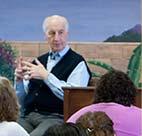Jack Hayford: Practicing What We Preach
Jack W. Hayford, “Practicing What We Preach” Ministries Today (Nov/Dec 2003), pages 22–27.
Jack Hayford sees the church in a moral crisis. “Favoritism, greed, shoddy morals and shady ethics have found a comfortable home in the church. At the same time, both inside and outside the church there is a rise in intolerance towards leaders who have been allowed to compromise with impunity their various institutions’ self–declared moral and ethical standards” (pg. 22). Despite this laudable intolerance the evangelical church, with its many denominational and independent groups, has no unified voice when in comes to confronting unethical leaders. “… there has been no standard policy guiding the body of Christ as it deals with its mavericks—the small but growing number of leaders who make their own rules and flaunt the ethical demands of a disciple of Jesus Christ” (pg. 22). It is in this context that he proposes a solution: “… I want to propose the establishment of an International Council for Ethical Accountability (ICEA)—or something with another title, but serving the church with what those words represent … Such a council could provide a starting place for an internationally agreed–on standard concerning basic ethical and moral issues as they pertain to church leadership” (pg. 23).

Jack Hayford / The King’s University
Hayford believes that such a council would allow the church to express a “collective voice” when responding to leadership failings: “While any one of a field of leaders may answer a reporter’s question … without a broad consensus, the public is left with the notion that every spiritual leader is basically a law unto themselves” (pg. 24).
Noting that luxury and extravagance has replaced self denial in many places (pg. 24), and that he has had to quietly withdraw from participation in two ministries because of their “law unto myself” attitudes (pg. 24), Hayford sees the need for judgment to come from within the church, lest it come from outside (pg. 27). “This isn’t a proposal for doctrinal agreement beyond basics, or for ecclesiastical or liturgical conformity. But written on all our hearts is a set of ethical principles that we intuitively know are right, and God’s word affirms a fundamental body of moral expectations that we all affirm. So the question is, do we believe that it possible that we can find a consensus on how we can strengthen one another by speaking with one voice where ethics are involved?” (pg. 27)
Hayford believes the answer is “yes.” How many others feel the same is yet to be seen. I look forward to seeing the responses to his proposal from evangelicals in the United States and abroad.
Reviewed by Mike Dies
Read the original article: http://ministrytodaymag.com/index.php/ministry-leadership/ethics/8215-practicing-what-we-preach
Category: Ministry, Spring 2004


